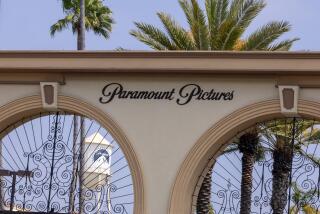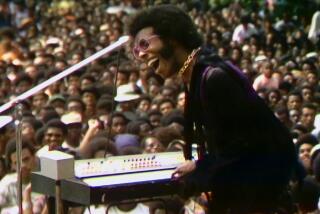Canceled ‘Noriega’ Project Too Risky, Oliver Stone Says : Movies: Script complications and $40-million-plus price tag also were factors in dropping the film.
- Share via
In the end, said Oliver Stone, creative complications with the script and financial risks in making a $40-million-plus film about Manuel Noriega outweighed the story he could tell about the former Panamanian strongman.
And so, the man who made such notable films as “JFK” and “Born on the Fourth of July,” decided his movie “Noriega”--which was to have starred Al Pacino--would not be made.
“Certain films shouldn’t cost as much as they do,” the director said. “It’s too risky.”
It seemed strange that Stone was giving up the Noriega project. After all, he had spent months, off and on, making his own inquiries into the 1989 U.S. invasion of Panama, as well as scouting locations in Central America, charming Panamanian officials and even conducting a three-hour prison interview last November in Miami with Noriega, who is appealing a 40-year sentence for drug trafficking.
But Stone said he became frustrated as a dramatist by a “lack of conclusions” about Noriega and, finally, the Iran-Contra affair.
“The real story is probably too complicated (for a movie),” Stone told The Times this week in a telephone interview from Buenos Aires, where he is casting and scouting locations for his next film, “Evita.” The long-delayed movie version of the Tony Award-winning Andrew Lloyd Webber musical is expected to begin production for Disney’s Hollywood Pictures within the next year. “If (Special Prosecutor) Lawrence Walsh couldn’t solve Iran-Contra, how could Oliver Stone?”
Furthermore, Stone said, Noriega is a man with “some negative characteristics, who is not easily understood.”
“I know him,” Stone said. “I spent three hours with him in prison.”
Movies with complicated story lines and ambiguous characters work, Stone said, when they are “done for a price.” One example, he said, is “The Crying Game,” which was nominated for the 1992 Academy Award for best picture.
Stone said movies today can quickly wind up becoming so expensive that it is difficult to justify them at that cost.
“There are pictures now costing between $80 million and $100 million,” Stone said. “They’re being accepted by rote. There is a madness in this thing that I was never part of. The most expensive picture I ever made was ‘JFK,’ which cost $40 million. I don’t particularly like to make expensive pictures.”
Stone may still be reeling from the box-office failure of his last (not inexpensive) movie, “Heaven on Earth,” the third in the director’s Vietnam trilogy, which grossed a mere $5.8 million domestically.
Once projected costs of making “Noriega” climbed to between $40 million and $50 million, Stone said, it became “too risky.”
When asked when it dawned on him that he had to halt the project, Stone said, “At 4 o’clock in the morning in a dream. . . . I was in hell. It wasn’t easy.”
The projected production costs had climbed rapidly, the director said, because there was considerable “map jumping” involved--location shoots in Panama, Cuba, Europe, Miami and Washington, D.C. Since the film focused on the past four years of Noriega’s life and the invasion of Panama, there also would be huge costs incurred staging battle scenes.
But the story itself was complicated, charting the rise of Noriega and his relationships with former President George Bush, Oliver North and Cuban leader Fidel Castro.
“The problem was trying to figure out how to tell Noriega’s story in a two-hour movie,” said a source close to Stone. “One day, Noriega is meeting with Bush. The next day he’s meeting with Castro. The next day, he’s meeting with some drug kingpin. It was just a bizarre multi-layered story that is not easy to tell.”
One source said Stone left his interview with Noriega realizing he didn’t have a lot to work with. Noriega had refused to be quoted regarding his legal appeal and any new evidence he may present.
Stone’s own inquiries in Panama also didn’t seem to fill out the story any better.
“It seems like they (Stone and his associates) thought Noriega would be some great nationalist who had fought for his people . . . a Creole Bonaparte,” said a source in Panama familiar with the project. “But they found out Noriega was just a weasel.”
The source also said that while President Guillermo Endara’s government seemed quite amenable to the movie production, there were numerous logistical problems typical of the tropics but probably infuriating to Stone’s people. They wanted to see some of the old headquarters of the Panamanian Defense Force--the army controlled by Noriega and disbanded in the invasion--but found the place wouldn’t open on the weekend. When they went to see Noriega’s home, the man with the key, despite an order from a judge to let them in, simply didn’t show up. It wasn’t political, just incompetence, says the source.
Stone said when he made up his mind not to proceed with the film, he informed both Pacino and producer Arnon Milchan, whose company, New Regency Entertainment, was going to finance the film. Warner Bros. was going to distribute the movie.
Some film industry sources suggested that a key factor in halting “Noriega” was a feeling that Pacino might not have had the box-office appeal to open the movie. They noted that Pacino’s last film, “Carlito’s Way,” grossed only $36 million domestically.
“It was a dark, brooding look at a criminal,” one source said of “Carlito’s Way,” noting, “Now, they were going to come back with another dark and brooding look at a criminal? If ‘Noriega’ was going to star Al Pacino, it had to be done for a price. Had ‘Carlito’s Way’ done $75 million at the box office, I guarantee you ‘Noriega’ would be made today.”
Stone, however, said Pacino was not the issue--the Noriega story and the projected costs of location shoots were. “It’s just the nature of the (film) business,” Stone said. “The cost just grows and grows. I don’t know the solution.”
Times Central America Correspondent Tracy Wilkinson in San Salvador contributed to this story.
More to Read
Only good movies
Get the Indie Focus newsletter, Mark Olsen's weekly guide to the world of cinema.
You may occasionally receive promotional content from the Los Angeles Times.










